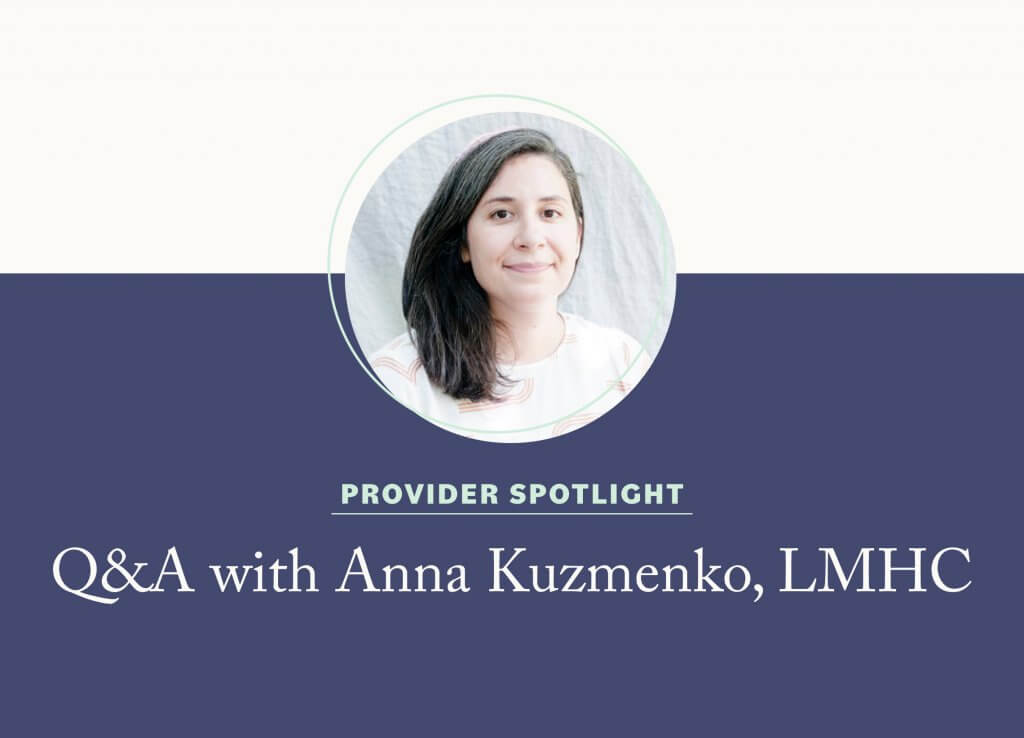Integrated 360 care is a health delivery model in which all members of a patient’s care team—medical providers, mental health specialists, and healthcare navigators—collaborate and communicate to optimize patient outcomes. Eden Health embraces this model, and you can learn all about it in our free e-book, A 360 View: A Closeup Look at Integrated Care. In this blog series, you’ll meet some of Eden’s care providers and learn how they create healthier workplaces and workforces.
What does the LMHC in your title stand for?
It stands for “licensed mental health counselor.” I got my Master’s degree in Counseling and have done postgraduate work and training in my field as well, and I’m licensed by a state board. What can I say, I like talking to people!
Where did you work prior to Eden Health?
I joined Eden in November 2019. Before that I worked with the Mental Health Service Corps, Mayor de Blasio’s initiative to expand mental health care to New Yorkers in marginalized communities and groups. I provided free—government paid—psychotherapy to people in need who couldn’t afford it. I’m glad I did that as I was able to help a lot of people, and I’m grateful to be able to apply my experience to Eden now.
Under integrated 360 care, how do you collaborate with primary care doctors?
I support my patients through weekly therapy sessions. Right now, those sessions are virtual because of the pandemic. If a patient needs integrated collaborative care, I’ll engage with their primary care provider and then we’ll consult with the psychiatrist. Then I’ll circle back with the patient: here’s what the psychiatrist thinks and here’s what your PCP thinks. Sometimes it’ll actually prompt the PCP to go out of their way and message the patient and say, “Hey, your therapist spoke with me about your concerns. I would love to chat with you about it as well.”
Better outcomes mean that we have to be communicating with each other and work as a team to ensure we’re on the same page. It’s important that the patient knows that we’re thinking about them, talking about them, and caring for them.
How does this collaboration work in practice? Can you give an example?
I have a patient right now who is suffering from severe depression and needs a lot of support. I’m really glad she’s with Eden because we’re doing integrated care with her. I have been talking to her PCP every week: we consult by exchanging messages back and forth. After the PCP and I meet with the patient each week, the PCP and I talk, and we bring in the psychiatrist as well.
Of course, the patient knows that we do this—we ask for her permission and she knows that we’re all on her team. And I think she feels very taken care of because there’s an actual team who engages with her every single week. It makes her feel good to know that she’s being looked after and nurtured. And I think Eden has been fantastic for her—if she wasn’t here, she wouldn’t be getting a therapist talking to her PCP and consulting with the psychiatrist, week to week.
How else does Eden Health help you provide better care?
I can help patients that are not necessarily part of my caseload if an individual is in a crisis. This happened a month ago. The PCP asked me to check in on their patient and be there therapeutically for him. I could tell medication would help him, so I was able to circle back with the PCP for a prescription. Thanks to Eden, the patient got put on antidepressant medication within days after a therapy session. This would’ve never happened if I were in private practice—no way would I have been able to find and speak with a PCP, have the PCP talk to the patient, and put the patient on medication within a span of three days.
Like so many therapists right now, you’ve switched to a completely virtual care model. How does Eden help with this?
Providing virtual care during the pandemic really highlights how much we need to live in a tech-enabled world. Half of my patients don’t even live in New York City anymore. They’ve left, but we can still continue care and therapy. I think the Eden Health app is a hundred percent necessary, because otherwise, how would we continue engaging?
What’s so cool about Eden is, we were ready to go virtual from the beginning—it’s been a part of our care model from the start. A lot of behavioral health clinics or medical clinics weren’t prepared; they had to scramble and they’re really still figuring it out.
Does the Eden Health mobile app help you provide continuous care?
For therapists like me, the app is a huge deal. In traditional private-practice behavioral health, you only talk to patients once a week during your session. At Eden, it’s awesome to message a patient on the app to check in whenever I need to, without having to call or wait a week. That’s a huge differentiator for Eden: we can be therapists who are accessible, which is the way it should be.
What do your patients say about Eden?
I consistently hear how much patients love Eden. They are amazed because they’ve never been treated with such concern, and their time is really respected. They’re always telling me, “I can’t believe I can touch base with someone about my specialist’s bill in five minutes.” The accessibility is unlike anything anyone’s ever seen before.
What do you like most about working with Eden?
Even though I’m in a therapy session alone, I never feel alone. I know that I have a whole team right outside the session, ready to support me with the patient. Of course nowadays my team’s not literally in the next room—we catch up by texting, emailing, calling, and Zooming. But still, I have a whole team that has my back. At previous jobs, my role felt siloed at times, but I have never felt alone at Eden.
Want to learn more about how our providers deliver integrated care? Check out our interview with Alyson Vogel, PA-C.





